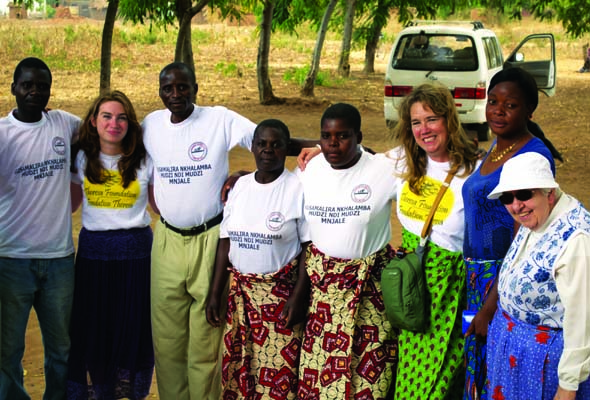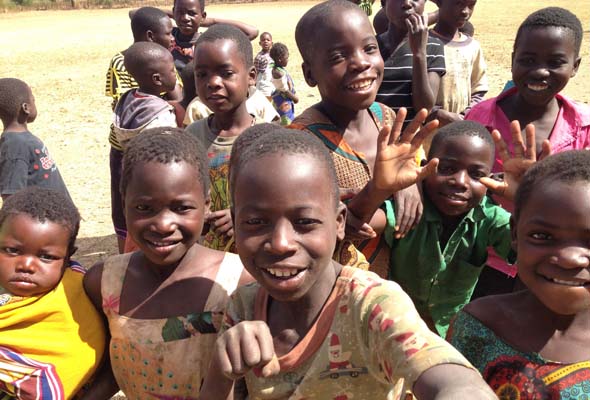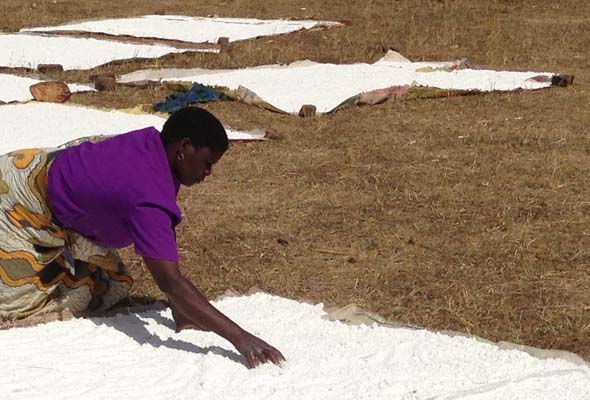by Ann Lambert, with Alice Abracen
One travel guide suggested Malawi’s unofficial motto is “maybe tomorrow.” On a family visit, we witnessed how difficult it is at times to get things done.
I am in a white van hurtling down the highway from Malawi’s capital, Lilongwe, toward the village of Mnjale. I am with my husband, two grown children and a close family friend. The countryside whizzes by, almost entirely deforested.
Little thatched huts huddle together, dotting the landscape. It is July 2015, the middle of winter here and also the dry season; everything that can be burned is burned, for cooking fires and to stave off the cold. Wood smoke chokes the air, and us. There is no soil to speak of, but red dust that swirls up in fierce tornados.
Men roll past on bicycles with charcoal bundles for cooking, towering over them. Somehow, one wobbles by with five (yes, five) 50-gallon water drums lashed to his bike. We pass a gaggle of girls, some with babies tied to their backs with colourful lengths of cloth called chitenjes. Some balance enormous water jugs on their heads. (I am told they learn to do this as toddlers, practicing with a mango or banana.) Girls here are often married by 13 or 14, and typically have six to eight children.
Malawi is one of the most densely populated countries in Africa, and it looks it. The highway is teeming with people, bicycles and pop-up markets along its shoulder. I am reminded that 45 percent of the population is under 15 years old. A little boy tries to flag us down, waving a long stick at us. On closer inspection we see about a dozen mice impaled on it — tails, skin and all. The boys catch them by setting fire to the roadside grass. Our driver, a tiny smile forming on his lips, asks us if we’d care for some. We are not in Montreal any more.
We turn off the highway to the village, our driver navigating the potholes, crevasses, and ravines marking the dirt road with skill and sang-froid. Our excitement is palpable. I am wondering if everything we have worked to build in the village will actually materialize. I am thinking about my mother, who died in 2011, and how proud she would be that we are carrying on her mission to help this community.
But mostly, I can’t wait to finally meet the people of Mnjale and its sister villages, Chilundu and Fuse.
***
This adventure began seven years ago, in a drastically different setting: my family sharing tea and playing Scrabble and Skip-Bo with a roomful of elderly women in my mother’s N.D.G. apartment building. It was our first fundraiser, back in 2008, and we raised around $400. I still remember my mother saying, her face flushed with excitement and fatigue, “Well, it’s a start.”
When I tell people I run a “family foundation” they look at me in a funny, suspicious way. Like the Rockefellers? Bronfmans? Not quite. My mother, Thérèse Lambert, started our foundation when she was 84, and living in subsidized housing on a $19,000-a-year Quebec pension. She became acutely aware of grandmothers in Southern Africa struggling to raise their HIV/AIDS-orphaned grandchildren through her work with the Stephen Lewis Foundation. But she wanted to do something more direct, personal, and well, small. And so she did.
She reached out to long-time family friend Roger Roome, posted with the Canadian International Development Agency in Lilongwe, Malawi, and charged him with finding a project supporting grandmothers and their grandchildren that could be sustained from Montreal. After examining many applications, Roome chose the tiny village of Mnjale in central Malawi.
Over the years, the foundation has raised money in many ways. Annual benefit concerts featuring Montreal musicians enabled us to build a community centre in Mnjale and continue to send nine girls to secondary school every year. Students from Royal West Academy raised enough money in 2014 to build a borehole well. Students at Dawson College perform sold-out shows every spring, whose box-office revenues buy seeds and fertilizer for maize farming and help feed hundreds of people.
***
First to greet us are the children of Fuse, one of the three villages the foundation supports. In the three villages are 187 grandmothers, 250 orphans and about 3,000 people all together. Hundreds of kids swarm us with shouts of Mzungu! (white person), something many have never seen before. Despite our best efforts to charm her, a baby cries when she catches sight of us.
We shake hands with hundreds, a dozen of whom wear the red chitenjes and white T-shirts bearing the “Theresa Foundation Malawi” logo. One of these is Melissa Banda, the single mother of three and a force of nature, who by 2010 had successfully registered the Mnjale grandmother group as a recognized charity under Malawi law. She runs the Malawian Theresa Foundation, deftly navigating the turbulent political waters of being a woman in a very patriarchal world.
Soon, we are seated under an awning they’ve built for us with the chiefs, the headmen, Banda, and Sister Gisèle Leduc, a 77-year-old nun from Granby who has worked with the Missionary Sisters of the Immaculate Conception Order in Africa for almost 40 years.
When the Harper government decided to close Canada’s embassy in Malawi in 2009, Roome asked Leduc to take on the oversight work. She was resistant at first; however, she was so inspired by the story of my mother, she did accept to provide both project oversight and to continue to mentor Melissa in project management. I marvel at her energy, her profound commitment to the people of Malawi, and her gentle sense of humour. She reminds me so much of my mother that I grow very close to her in the short time we are there. I think it is no coincidence that Sister Gisèle and the Theresa Foundation have found each other.
Shielded from the scorching sun, we are treated to the traditional dances of the Gule Wankulu: three women in brightly-coloured skirts dance as male drummers deliver a complex, frantic beat, then retreat to sing as men in masks and many, vivid layers of clothing. They move with a skill and explosive energy unlike anything we’ve ever seen.
***
In Malawi, subsistence farmers make up 85% of the population and women produce 75% of the nation’s food supply. Households affected by HIV/AIDS (caring for orphans or ill relatives and neighbours) represent 64% of Malawi’s population. Extremely poor and vulnerable households struggle to survive with these additional burdens. Life expectancy is 55 years.
Many of the grandmothers gathered before me are my age (58) or younger. Several hold their orphaned grandchildren. One cradles a little girl, her face bloated, her belly swollen. I am told that she, and as many as one-quarter of the three villages’ 250 orphans, suffer from kwashiorkor syndrome, a form of malnutrition that occurs when there is a lack of protein in the diet. A staple of the Malawian diet is nzima, a porridge made from ground maize meal that is entirely lacking in protein, but fills up a hungry belly. This year’s harvest was very poor. I look into the little girls’ eyes, and feel my voice choking. We resolve to make sure that Likuni Phala, a protein-rich supplement, is provided to the children in these villages as soon as possible. Once again, I am reminded of the contrast between the life in this village and our own insatiable economy and disposable consumer culture at home.
Before we leave Fuse for the next village, my son offers a precious soccer ball to a group of boys. Within minutes, a lively game is taking place on the soccer “field” — a grassless rectangle baked rock-hard by the sun. After the intensity of our first encounter, the explosive laughter and sheer energy of the barefooted boys chasing down the shiny new ball is exhilarating to watch.
***
Back in our van, we turn down a narrow, grassy path, past more desiccated maize fields and a few thirsty trees. And there they are, maybe 50 or so of the grandmothers or “gogos” of Mnjale, singing, clapping and dancing their welcome. Of the 187 grandmothers the Theresa Foundation supports, the gogos of Mnjale count among the very first Roger worked with in the early years of the foundation’s history. It is a meaningful moment for all of us.
Everyone is excited to show us everything. We visit the foundation’s tiny office, where a yellowing photograph of my mother is proudly displayed. I smile up at her, amazed again at what strange turns life’s journey can take. We see the bicycle ambulances that the foundation sent by container ship two years ago. We are shown the surrounding fields, the grain storage room, the borehole well, and the chicken and pigeon coops. I ask about the Christmas dinner we fund every year. This was the one thing my mother insisted must always be supported.
Soon after, we are in the Mnjale community centre the foundation funded, with about 60 grandmothers and a few of the orphans. I ask them how they are; what they need. They are like grandmothers everywhere in one sense: they complain of aches and pains, how much they like when we send Tylenol. Many ask for eyeglasses, as they can no longer see to do what work they can. They remind us that they are cold and need new blankets. They ask for new plastic sheets to roof their huts; the rainy season is coming. They watch me, listen for my interpreter and then either erupt in laughter or grimace. In disapproval? Sympathy? It is hard to tell, and I realize I feel quite nervous.
I tell them I loved their welcoming dance, and imagine them all coming to Canada to teach our grans how to move like they do. I tell them that in her last few years, Thérèse, my mother, had to use a walker to get around, and mime what that looked like. I tell them Thérèse, like them, loved to dance, and often reminded us she was a Jitterbug dance champion back in her day. One of the grans slowly gets up, and takes my hand. Hers is calloused leather. She wants me to dance.
We stand up, and so do most of the others, the ones who can. In that little whitewashed community centre, already infiltrated by termites and riven with cracks from the rainy season, we move our hips, shimmy, shake, clap and sing. In that little community centre we all built, starting with those N.D.G. grandmothers hovering over bingo cards and cups of tea.
***
It is so easy to be overwhelmed by the problems that plague Malawi. Forty per cent of the country’s budget is dependent on foreign aid, yet many believe that it inadvertently creates inequality, fosters dependence, and is not sustainable. It is not a permanent solution. Corruption is endemic. Gender inequality and violence are persistent, desperate issues. The country has one of the lowest GDPs in the world. Yet, we have been so moved and enriched by the sheer depth of human experience here. Through the creativity, resourcefulness and resilience of the people, we have seen that the modest amounts our foundation provides does make a difference.
I think of my mother presiding over our Thanksgiving feast year after year, asking us to say one thing we are grateful for. I think of how thankful we were, and are, for her. I think of the people we met, gripping our hands and thanking us again and again.
But we want to thank them: for the gift of allowing us this connection, for the privilege and honour of coming together as a family to reach out to families across the world. For inviting us all to dance. In the end, we are really not so different. As for a permanent, sustainable “solution” for Malawi? Maybe tomorrow.
Correction: The print version of this story misidentified Sister Gisele Leduc, pictured at top. The Senior Times regrets the error.






Be the first to comment on "Theresa Foundation renews commitment to Malawian grandmothers, orphans"